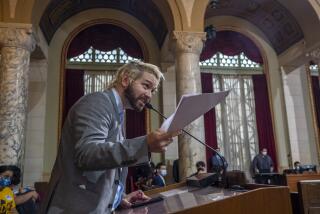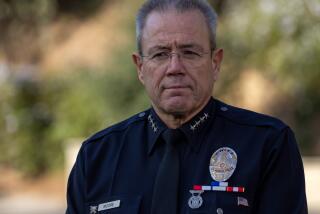Legal Motions Further Split King Defendants : LAPD: Briseno says Powell’s attorney has conflict of interest. Koon seeks to sever Briseno from the upcoming trial.
Two defendants in the Rodney G. King case filed motions in federal court Monday that seemingly further the division among the four police officers facing criminal charges.
In motions filed in U.S. District Court, Officer Theodore J. Briseno accused Michael P. Stone, who represents Officer Laurence M. Powell, of conflict of interest and asked for a hearing before Judge John G. Davies to ask for Stone’s removal.
On a day in which more than 15 motions were filed by defendants and prosecutors, Sgt. Stacey C. Koon, another of the co-defendants, sought to have Briseno severed from the trial, citing “antagonistic defenses.”
Briseno said in his motions that when King was beaten by officers after a car chase March 3, 1991, Stone was serving as the general counsel for the Los Angeles Police Protective League, meaning that, in effect, he represented Briseno, who was a member of the league.
But Stone, according to Briseno, then attempted to “eviscerate” Briseno’s defense during the state trial held in Simi Valley that resulted in not guilty verdicts. During the trial, Briseno broke from the three other defendants, testifying that he had tried to stop excessive force being used by the other three. Stone introduced several police officers as witnesses in the trial who testified against Briseno.
In court papers, Briseno said Stone “attempted to put together, as part of the Simi trial, a false defense to silence me as part of the police ‘code of silence.’ ” Briseno’s attorney, Harland W. Braun, who did not represent him during the state trial, said the conflict of interest will prevent Briseno from getting a fair trial unless Stone is removed.
Stone did not return phone calls and his secretary said he would not comment on Briseno’s motion. A hearing on Briseno’s request has not been set. If Stone is removed from the case, the trial, which is set to begin in February, could be delayed months while a new attorney becomes acquainted with the case, Braun said.
Braun acknowledged that the move by Briseno may widen the gulf that opened during the first trial between Briseno, Powell, Koon and former Officer Timothy E. Wind.
However, Braun also noted that the motion contains a statement from Briseno that says he believes his three co-defendants are innocent of the federal charges because they had no prior intent to use excessive force on King and deprive him of his civil rights. Federal prosecutors must prove intent on the part of the officers to win a conviction.
“I wish to emphasize to the court that I do not believe that any of my co-defendants are guilty,” Briseno said in the statement. “I do not believe they acted with a criminal intent in applying force to Mr. King.”
Braun said Briseno believes the officers acted out of fear of King, not a plan to beat him.
“Ted could be the best witness for these guys,” Braun said. “He has always felt it was excessive force, but not with intent, just fear.”
Other attorneys involved in the case did not return calls for comment. Assistant U.S. Atty. Steven D. Clymer declined to comment.
Koon and the government filed motions asking that jurors in the case be sequestered and that their identities be kept secret. The government also seeks to be allowed to introduce prior acts of alleged misconduct by Powell, Koon and Briseno. In other motions filed Monday, Briseno sought to have the case dismissed against him because he did not engage in using excessive force on King. Briseno and Koon challenged the indictment under theories of double jeopardy.
Briseno also raised concerns about getting a fair trial. He cited the riots that followed the verdicts in the first trial, the tensions surrounding the prosecution of four men in the beating of truck driver Reginald O. Denny during the riots, and the inclusion of the videotape of the King beating in the upcoming Spike Lee film, “Malcolm X.”
The fear of new riots, public disapproval and even physical danger may make it impossible to find jurors who would return guilty verdicts, the statement says.
“If such a juror could be found, one might question his or her sanity,” the document reads in part. “What reasonable person would not hesitate to vote not guilty knowing that the results of a previous juror’s vote were catastrophic to both the society and the jurors themselves?”
More to Read
Sign up for Essential California
The most important California stories and recommendations in your inbox every morning.
You may occasionally receive promotional content from the Los Angeles Times.










